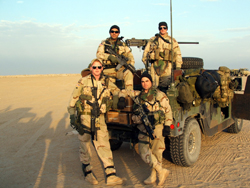Deciphering a government’s motive for going to war can be a daunting task; understanding an individual’s desire to participate in a war as a soldier can be similarly challenging. The documentary Brothers At War attempts to bring the soldier’s world to its audience in order to explain this big, looming “Why?”question. However, the film falls short of this lofty goal, merely presenting one brother’s envious quest to prove his self-worth.
 Director/producer/narrator Jake Rademacher failed to achieve his childhood dream. As a boy, his one and only ambition was to become a West Point-trained soldier, orienting his jobs, activities, and lifestyle toward this goal. When the rejection letter arrived in the mail, Rademacher saw the future that he was so prepared to take part in vanish before his eyes. What is a man with no goals to do? In Rademacher’s case, he gets an English degree and goes into film, yet his failed past continues to haunt him.
Director/producer/narrator Jake Rademacher failed to achieve his childhood dream. As a boy, his one and only ambition was to become a West Point-trained soldier, orienting his jobs, activities, and lifestyle toward this goal. When the rejection letter arrived in the mail, Rademacher saw the future that he was so prepared to take part in vanish before his eyes. What is a man with no goals to do? In Rademacher’s case, he gets an English degree and goes into film, yet his failed past continues to haunt him.
Conceptually, the goal of the documentary makes sense. The five Rademacher boys went in completely different directions, two of them successfully following the path their narrator brother once intended to follow. Brothers Isaac and Joseph undergo vast changes in their lives due to the impact of the war and training itself, and now Rademacher has little more than a distant understanding of his kin.
In practice, however, the film is simply a compilation of shoddy camera work, marred by a lack of understanding of contrast levels and basic film editing techniques, giving Brothers the feel of a home video.
The idea loses focus at various points in the story, as Jake dismisses the stated goal of the effort in favor of better understanding himself. His placement into a situation, standing alongside armed soldiers in the Iraqi warzone, that he once dreamed would be his career reeks of awkwardness; he doesn’t fully comprehend how vastly different he is from his company.
The portrayal of both Isaac and Joseph is limited, as they remained at home during Jake’s two-week trek through war-torn Iraq. However, the film’s only accomplishment may be its depiction of the difficult family life of a soldier; the camera follows Isaac as he comes to terms with the fact that his baby daughter may not recognize him the next time he comes home.
Brothers at War isn’t a complete waste, as it makes a sincere attempt to explore the lonely life of a soldier. It quickly derails, however, when the filmmaker indulges too strongly in introspection. When Jake Rademacher, the man with dreams of being a warrior, realizes his greatest achievement is as the voiceover for Budweiser All American Ale commercials, it’s easy to understand why he doesn’t feel comfortable sitting at the dinner table and staring into the faces of his two brothers, each representing the warrior he could never become.






You must be either extremely jealous of Jake, or you have issues with our troops! This film was not only emotionally charged, it was wonderfully received. What did you expect to happen in terms of a documentary’s filming? Did you think the Pentagon was going to give the nod to a group of photographers, directors, producers and assistants? You can only fit so many in a TANK you moron!
Without getting too verbal about how I feel about you and your inept review – – suffice it to say that Jake Rademacher’s love for his brothers and his fully-met goal of brining to us this beautifully told story is spot on!
I would suggest you look both ways when you cross the streets from now on. You may not see the CAMO coming at you for your hating on Rademacher!